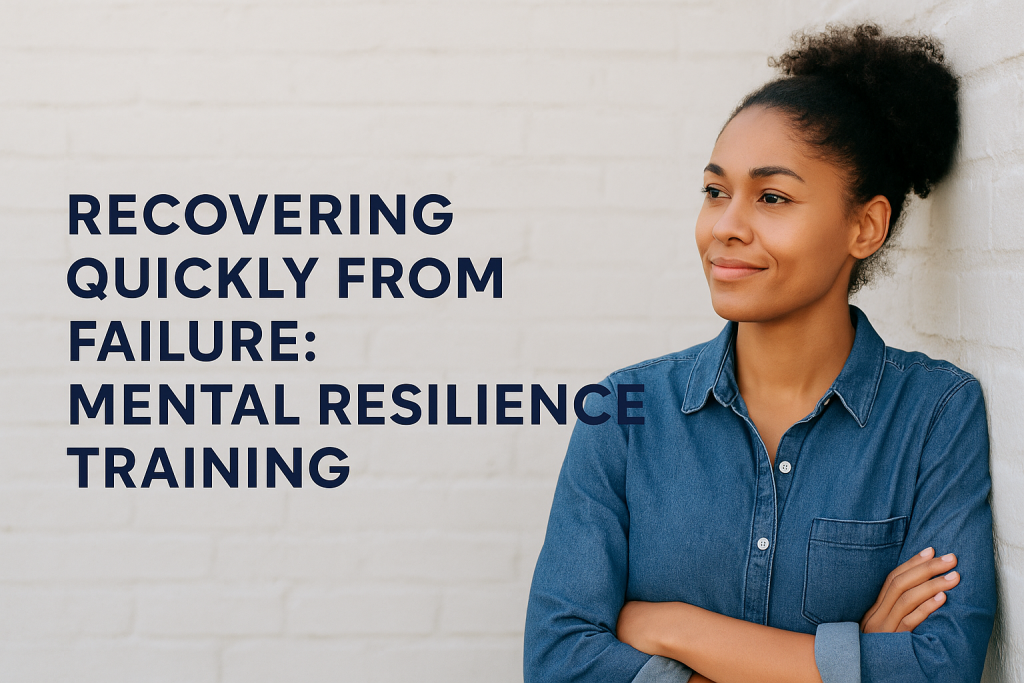Recovering Quickly from Failure: Mental Resilience Training
Build your inner strength and bounce back faster from life’s setbacks
Does Failure Sometimes Knock the Wind Out of You?
We’ve all been there — a project falls apart, a job interview doesn’t go as planned, or a personal goal slips through your fingers. Failure can feel like a punch to the gut, leaving you drained, defeated, and doubting yourself.
But what if failure wasn’t the end — but the beginning of something stronger? The ability to recover quickly from setbacks isn’t luck or genetics — it’s a trainable skill called resilience.
In this article, we’ll explore recovering quickly from failure through mental resilience training. You’ll learn how to shift your mindset, process challenges, and emerge even stronger on the other side.
—
What Is Mental Resilience?
The Psychology of Bouncing Back
Resilience is the ability to adapt and recover from adversity, trauma, or significant stress. It doesn’t mean ignoring pain or pretending to be “tough.” It means being able to feel, reflect, and move forward — with clarity and courage.
Why Resilience Matters
Resilient people are better equipped to handle life’s ups and downs. They’re more confident, emotionally stable, and proactive. And the best part? Resilience isn’t fixed — it can be developed through conscious practice.
—
How to Recover Quickly from Failure
1. Feel the Emotion, But Don’t Stay Stuck
Allow yourself to feel disappointment, frustration, or sadness. Suppressing emotions only prolongs the healing process. Take a breath, journal your thoughts, or talk to a trusted friend. Acknowledge your emotions without judgment.
2. Reframe the Story
Failure is not a reflection of your worth. It’s an event — not an identity. Ask yourself:
- “What did I learn?”
- “What could I do differently next time?”
- “How is this experience helping me grow?”
Reframing the narrative helps shift from self-blame to self-awareness.
3. Focus on What You Can Control
After a setback, it’s easy to ruminate on the past. But true recovery happens when you redirect your energy toward the present. What actions can you take today to move forward — even a small step?
—
Train Resilience Like a Muscle
4. Practice Mental Flexibility
Things won’t always go as planned — and that’s okay. Mental resilience means adapting when needed. Try asking: “Is there another way to look at this?” or “What are my options now?” This builds cognitive agility and problem-solving skills.
5. Build a Support Network
Connection is key to resilience. Share your struggles and successes with people who listen without judgment. Whether it’s a mentor, coach, therapist, or friend — having support accelerates recovery and boosts confidence.
6. Maintain a Growth Mindset
Resilient individuals believe they can improve with effort and feedback. Instead of “I failed,” think “I’m learning.” Celebrate progress, not perfection. Each setback becomes a stepping stone, not a dead end.
—
Daily Practices to Strengthen Resilience
✔ Gratitude Journaling
Writing down three things you’re grateful for each day shifts focus from failure to appreciation — a proven strategy to increase mental well-being.
✔ Mindfulness and Breathing
Practicing mindfulness or even deep breathing helps calm the nervous system and creates space between thought and reaction.
✔ Healthy Habits
Sleep, movement, and nutrition all impact emotional regulation. Physical well-being supports mental recovery.
—
Conclusion: Resilience Is a Skill, Not a Trait
Failure is inevitable — but staying stuck doesn’t have to be. With intentional mindset shifts and daily habits, you can train your brain to recover faster, grow stronger, and move forward with courage.
Your setbacks don’t define you — your comeback does.
✨ Want to begin today? Choose one small action you can take to move forward from your last setback. Then subscribe for weekly tools and mindset tips to help you build lasting resilience.
